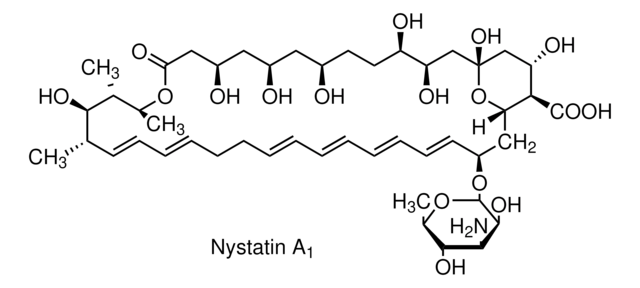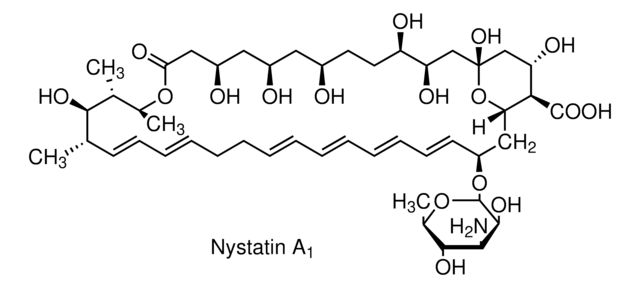A2942
Amphotericin B
solution, suitable for cell culture, BioReagent
Synonym(s):
Amphotericin, Fungizone
About This Item
Recommended Products
product name
Amphotericin B solution, 250 μg/mL in deionized water, 0.1 μm filtered, BioReagent, suitable for cell culture
Quality Level
sterility
0.1 μm filtered
product line
BioReagent
form
liquid
concentration
250 μg/mL in deionized water
technique(s)
cell culture | mammalian: suitable
color
yellow
antibiotic activity spectrum
fungi
yeast
Mode of action
cell membrane | interferes
shipped in
dry ice
storage temp.
−20°C
SMILES string
[H][C@]12C[C@@H](O[C@@H]3O[C@H](C)[C@@H](O)[C@H](N)[C@@H]3O)\C=C\C=C\C=C\C=C\C=C\C=C\C=C\[C@H](C)[C@@H](O)[C@@H](C)[C@H](C)OC(=O)C[C@H](O)C[C@H](O)CC[C@@H](O)[C@H](O)C[C@H](O)C[C@](O)(C[C@H](O)[C@H]1C(=O)O[Na])O2
InChI
1S/C47H73NO17/c1-27-17-15-13-11-9-7-5-6-8-10-12-14-16-18-34(64-46-44(58)41(48)43(57)30(4)63-46)24-38-40(45(59)60)37(54)26-47(61,65-38)25-33(51)22-36(53)35(52)20-19-31(49)21-32(50)23-39(55)62-29(3)28(2)42(27)56/h5-18,27-38,40-44,46,49-54,56-58,61H,19-26,48H2,1-4H3,(H,59,60)/b6-5+,9-7+,10-8+,13-11+,14-12+,17-15+,18-16+/t27-,28-,29-,30+,31+,32+,33-,34-,35+,36+,37-,38-,40+,41-,42+,43+,44-,46-,47+/m0/s1
InChI key
APKFDSVGJQXUKY-INPOYWNPSA-N
Looking for similar products? Visit Product Comparison Guide
Related Categories
General description
Application
- as an intraperitoneal injection for the treatment of Aspergillus fumigatus infection in mice
- as a constituent of aspiration medium for the culture of Chinese Merino ewe ovaries
- as a constituent of transport medium during the collection of equine corpora lutea
- as a supplement in RPMI medium for the culture of the mouse-mouse B cell hybridoma 55-6 cell line
Biochem/physiol Actions
Packaging
Components
Caution
Preparation Note
Other Notes
also commonly purchased with this product
Storage Class Code
12 - Non Combustible Liquids
WGK
WGK 1
Flash Point(F)
Not applicable
Flash Point(C)
Not applicable
Personal Protective Equipment
Certificates of Analysis (COA)
Search for Certificates of Analysis (COA) by entering the products Lot/Batch Number. Lot and Batch Numbers can be found on a product’s label following the words ‘Lot’ or ‘Batch’.
Already Own This Product?
Find documentation for the products that you have recently purchased in the Document Library.
Customers Also Viewed
Articles
Human renal proximal tubule epithelial cells (RPTECs) are commonly used to predict human renal drug permeability and to investigate drug efflux. We have generated transporter knockout (KO) cell lines using CompoZr® Zinc Finger Nuclease (ZFN) technology in a proprietary renal proximal tubule epithelial cell line.
An overview of human microbiome research, workflow challenges, sequencing, library production, data analysis, and available microbiome reagents to support your research.
Antibiotic kill curve is a dose response experiment in which mammalian cells are subjected to increasing amounts of selection antibiotic
Our team of scientists has experience in all areas of research including Life Science, Material Science, Chemical Synthesis, Chromatography, Analytical and many others.
Contact Technical Service








